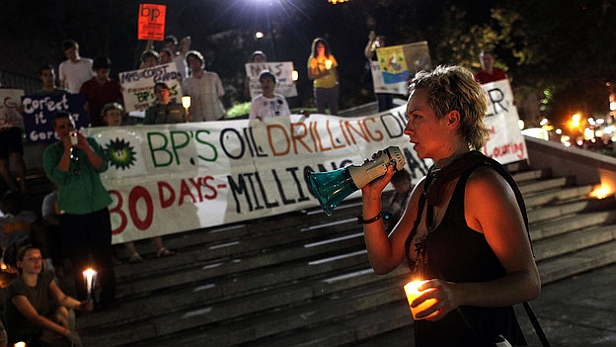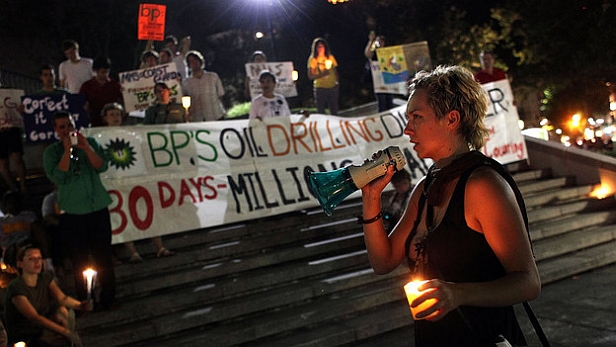A few days ago, Dave asked a question that seemed to strike a chord with readers. In the face of coal miner deaths, the Gulf oil leak, the corrupt regulators that enabled it, and freak weather such as the Nashville flood, he asked:
And yet where are the protests? Where are the people in the streets? Where is the popular movement demanding an end to fossil-fuel addiction and promising to eject legislators who stand in its way? I don’t see it. Sure I’ve seen Facebook petitions and the odd cluster of people outside the White House waving signs, but there’s no uprising. No politician feels threatened or fears the consequences of voting against a clean energy bill.
One tentative, partial answer comes from a Getty image from New Orleans last night, where protesters held a candlelight vigil to protest the one-month anniversary of the BP disaster:
 Getty
Getty
One month in, with oil washing into fragile Louisiana marshlands, anger over the spill seems to be rising still. It’s directed at both BP and federal regulators — two camps that are eager to shift the heat onto the other.
“Why wouldn’t they have any contingency plan? I’m not a genius and even I would have thought of that,” a Florida Keys musician said to NPR.
One organized vigil does not make a revolution, of course. It might be a start. We’re still waiting for leaders to channel this frustration into something constructive. President Obama finally gave passing reference to how the Gulf disaster connects to our fossil-fuel dependency today when he rolled out new performance standards for large trucks:
“We know that our dependence on foreign oil endangers our security and our economy,” he said [full text]. “We know that climate change poses a threat to our way of life — in fact we’re already seeing some of the profound and costly impacts. And the disaster in the Gulf only underscores that even as we pursue domestic production to reduce our reliance on imported oil, our long-term security depends on the development of alternative sources of fuel and new transportation technologies.” [Emphasis mine.]
It’s still weak sauce; it’s not the loud and clear message the president should be giving. But at least he makes more sense that Kentucky Republican Senate candidate Rand Paul, who says it’s no time to be holding BP accountable.
“What I don’t like from the president’s administration is this sort of, ‘I’ll put my boot heel on the throat of BP,'” he told ABC’s Good Morning America this morning. “I think that sounds really un-American in his criticism of business.”
I don’t know where to begin responding to that.
Anyway, there’s probably more grassroots action responding to the BP spill that I haven’t heard about. What’s going on out there, readers?




